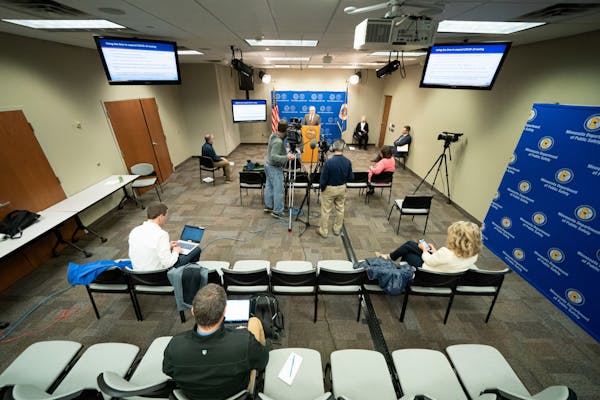Gov. Tim Walz is asking Minnesotans to continue to stay at home unless absolutely necessary in order to slow the spread of coronavirus in the state. The stay-at-home order — and Walz's extension on Wednesday — is his most sweeping executive action to slow the spread of the virus and help hospitals prepare for more patients. But it's far from a total lockdown of the state.
What does Walz's new order say?
The governor is extending the stay-at-home order to May 4. Originally he asked Minnesotans to stay home except for essential needs and services from March 27 to April 10, but he said the extreme social distancing measures were proving effective in helping to flatten the curve of cases.
What are essential needs and services?
The order still allows people to leave the house for things such as groceries, gas, emergency medical services or supplies, caring for family members, friends or pets and moving between emergency shelters for those who are homeless. And people who work in "critical sectors" are exempt from the order, including health care workers, emergency responders, law enforcement, shelters, child-care facilities, food production, utilities, the news media and critical manufacturing. Other workplaces are asked to shift to a telework and work-from-home model.
Did Walz declare more jobs as essential in his extended order?
Yes, Walz added additional guidance to his order, exempting any jobs that support "minimum basic operations in all businesses," including maintaining the "value of the business' inventory, preserve the condition of a business' or other organization's facilities, physical plant, or equipment, ensure security, process payroll and employee benefits, or for related functions," according to the order.
What else will stay open?
Hardware stores, post offices, convenience stores, funeral homes, pharmacies, banks and food shelves will continue to stay open under the order. The state Legislature is also open under the order, but lawmakers have already restricted access to the public and moved to an on-call basis to pass emergency legislation.
Are residents allowed to go outside?
Yes, the order still allows people to get outside for "walking, hiking, running, biking, hunting, or fishing," but with the appropriate social distancing.
What about liquor stores?
Liquor stores are allowed to stay open, as they were under the previous executive action.
Are there more restrictions for bars and restaurants?
Bars and restaurants in Minnesota are already closed to dine-in customers, but on Wednesday Walz extended that order to May 4. Restaurants can still serve delivery and takeout.
What about real estate and ongoing construction projects?
The order considers most real estate and construction jobs essential, so it won't fundamentally change the way housing in the Twin Cities is bought, sold, built and rented. People are still allowed to move into a new home under the executive order.
Any update on school closures?
Public K-12 schools across the state are also closed under a separate executive order issued by the governor until May 4. On Wednesday, Walz said it's "unlikely" that students will return to their classrooms after that date, but he hadn't decided "100 percent" yet.
What about transportation such as roads, transit and airports?
Roadways, public transit and the airport will still be up and running under the order for essential travel in and out of the state. People who are outside of the state are still able to return, under the order.
How are these orders enforced?
For individuals, a willful violation of the order in Minnesota comes with the penalties of a misdemeanor, punishable by up to 90 days in jail or up to $1,000 in fines. There have been some fines handed out for violation, but Walz said law enforcement will be more focused on educating the public than writing tickets.
The extended order does include new penalties for businesses who put their employees in situations where they violate the stay-at-home order. That could mean a gross misdemeanor for a business owner or supervisor, which comes with a penalty of up to $3,000 or a year in prison.
What do the experts say?
Experts say extreme social distancing measures have proved effective in places like China, where officials shut down Wuhan, the epicenter of the outbreak, in January. That helped them isolate the virus in a few areas and focus their resources on the areas that needed it most. "It's clear that social distancing measures are the most effective thing we can do early on," said Ryan Demmer, an associate professor in the epidemiology and community health division of the University of Minnesota's School of Public Health.
Is everyone in absolute agreement with this order?
No. Some leading state Republicans have raised doubts about the order and its impact on the state's economy. Senate Majority Leader Paul Gazelka, R-East Gull Lake, said he had "grave concerns" about Walz's initial state at home order and the impact on the economy. When Walz extended the order, Gazelka tweeted that he did not "approve of the Governor's unilateral decision to continue the order to shelter at home until May 4th. We have to get on with our lives."
What is the governor trying to accomplish?
By extending the stay-at-home order, Walz said he expects the peak of COVID-19 cases in the state to be pushed back to July, giving officials enough time to expand hospital bed capacity, acquire more testing supplies and get more ventilators and protective equipment.

Want to share info with the Star Tribune? How to do it securely

'Safe recovery sites' would offer syringes, naloxone and more to people using drugs. The plan could be in peril.
New Minnesota GOP leaders seek peace with party's anti-establishment wing

Who is Republican Lisa Demuth, Minnesota's first House speaker of color?

